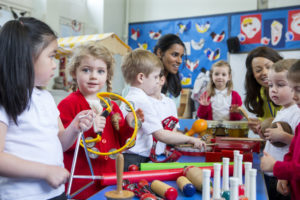 For many parents, picking a local preschool program is one of the first important decisions they’ll make in terms of their child’s education. Not only can attending preschool have a direct effect on grade school readiness for all, but 60% of at-risk children were found to be more likely not to go to college if they didn’t get a head-start with a high-quality education in preschool. Even if you know attending preschool matters, you may not know which factors mean the most when selecting your program. Which are the most important things to look for in a preschool? We’ll explore them here.
For many parents, picking a local preschool program is one of the first important decisions they’ll make in terms of their child’s education. Not only can attending preschool have a direct effect on grade school readiness for all, but 60% of at-risk children were found to be more likely not to go to college if they didn’t get a head-start with a high-quality education in preschool. Even if you know attending preschool matters, you may not know which factors mean the most when selecting your program. Which are the most important things to look for in a preschool? We’ll explore them here.
- Teaching philosophy
There are all kinds of preschools out there, ranging from academically challenging to play-based. Each has their merits, and there’s likely a preschool that will fit in quite nicely with your parenting style and desires for your child’s education. There’s no one-size-fits-all solution for everyone, but it’s important that you choose a school with a philosophy that’s reflective of your own. Even if a particular school is highly ranked and respected, it may not be the right fit for your family if its emphasis doesn’t line up with yours. - Scheduling and routines
Your own work constraints may determine the kind of preschool that works best for your child. If you don’t have a flexible schedule of your own, a half-day preschool might present more of a burden on your family in several ways. However, if you have some flexibility with your job, that sort of schedule may be the best way for your child to receive a good education without sacrificing family time. You’ll also want to get a good feel for what your child’s day will look like once they’re at school. Children will typically benefit from having a specific daily routine, but you know your child better than anyone. If you have specific concerns or questions about how a school structures their students’ day, be sure to get clarification and assess whether it will serve your child well. - Class size
There are several benefits to having lower child-to-teacher ratios (or class sizes of 15 of fewer. Smaller class sizes have a positive impact on students, due to the tendency towards easier management, and better cooperative play and engagement–and a lower child-to-teacher ratio will allow for more individual attention. While these are important factors, a smaller class size will have little or no benefit without well-qualified teachers, so that should be part of your evaluation as well.
In the end, there are many things that will go into your choice of a local preschool program: the school’s central philosophy, its structure, and the quality of the teachers. It is important to keep your values and needs in mind when making your decision. Please don’t hesitate to reach out to us with any questions you have. We’re here to help!


